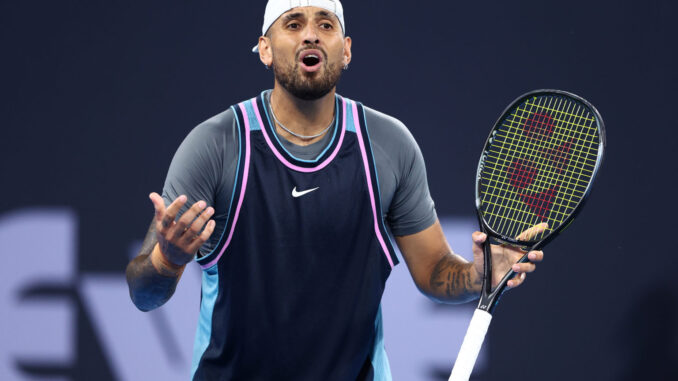
Nick Kyrgios, the Australian tennis maverick known for his electrifying talent and outspoken nature, has once again stirred the pot, calling for sweeping changes to the ATP Tour’s structure. Speaking on The Changeover podcast, the former World No. 13 didn’t hold back, branding the current setup “so unprofessional” and outlining two bold reforms: shortening the grueling season and scrapping lower-tier ATP 250 tournaments. His comments, delivered with characteristic candor, come amid his involvement in a high-stakes lawsuit by the Professional Tennis Players’ Association (PTPA), which he supports, aimed at reshaping the sport’s governance to better serve players.
Kyrgios, sidelined by injuries since 2023 but still a commanding voice in tennis, argued that the ATP’s 11-month schedule is unsustainable, leaving players physically and mentally drained. “The schedule is way too long,” he declared, proposing a dramatic overhaul where no tournaments would be held between the US Open and the Australian summer. This would give players a proper off-season to recover, a luxury rarely afforded in the current calendar. He pointed to the sparse crowds at events like the Antwerp 250, noting, “Who is watching Antwerp 250? The crowds are empty. The highlights are embarrassing.” Kyrgios believes the oversaturation of tournaments dilutes fan engagement, as “people just don’t show up because they were like, I can watch tennis whenever, it’s all year round. It’s ridiculous.”
His second demand—eliminating ATP 250 events—aligns with sentiments from players like Carlos Alcaraz and Frances Tiafoe, who criticize the extended Masters 1000 events, while Kyrgios sides with Aryna Sabalenka in favoring fewer, higher-quality tournaments. “There are too many tournaments,” he insisted, arguing that condensing the tour would boost excitement and attendance, making each event feel like a must-watch spectacle. This vision reflects his broader frustration with the ATP’s player welfare policies, which he sees as prioritizing revenue over well-being. “We work hard, you spend your whole life building to a point of getting paid as an athlete and you are not even getting paid right,” he said, highlighting the financial inequities players face.
Kyrgios’s advocacy is amplified by his role in the PTPA, co-founded by Novak Djokovic and Vasek Pospisil in 2021 to champion player rights. The organization recently filed lawsuits in New York, the UK, and Europe against the ATP, WTA, ITF, and ITIA, accusing them of anti-competitive practices and neglecting player welfare. Issues like late-night matches, extreme heat conditions, and inconsistent tennis balls—previously criticized by Kyrgios amid his wrist injury struggles—are central to the PTPA’s case. “We’re the only sport in the world that doesn’t have a players’ association,” he emphasized, underscoring the need for a union to amplify player voices. “The PTPA’s first goal was to get the players to be heard. I feel like we don’t get heard.”
Despite his limited play—only three matches since 2023 due to knee and wrist surgeries—Kyrgios remains a polarizing figure. His seven ATP titles, 2022 Wimbledon final run, and victories over the Big Three (Djokovic, Federer, Nadal) in their first meetings showcase his potential, yet his career has been marred by controversies, including fines for unsportsmanlike conduct and a 2019 suspended ban. Now 29, Kyrgios is using his platform to push for systemic change, warning, “This will be a special moment in tennis, for sure. Things needed to change.” His call for reform, however, faces resistance, with the ATP defending its 50-50 governance model and $110 million in recent player revenue increases, while the WTA called the PTPA’s suit “misguided.”
As Kyrgios prepares for a potential doubles-focused return, possibly at Wimbledon using his protected ranking, his influence off the court is undeniable. His vision for a shorter, more player-friendly tour could reshape tennis, but the road to change is fraught with challenges. For now, Kyrgios’s fiery rhetoric keeps the spotlight on the sport’s future, demanding a game that respects its athletes as much as its fans.
Leave a Reply